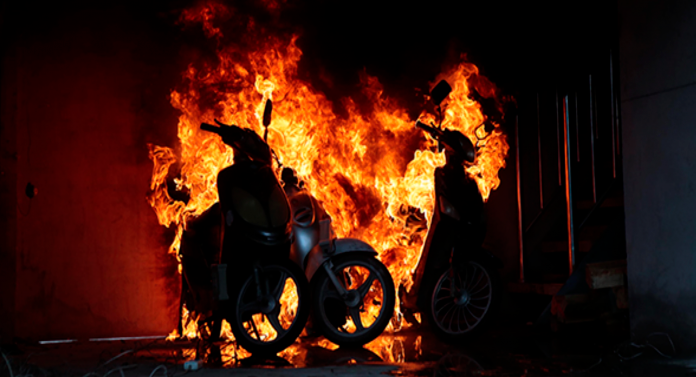In the wake of the recent fire incident at a warehouse storing electric vehicle (EV) batteries in Chatuchak district, Thailand, Bangkok Governor Chadchart Sittipunt has demonstrated swift and proactive leadership. Recognising the significance of the issue, he has directed local officials to conduct a comprehensive assessment of the warehouse that was affected by the fire. Moreover, he has announced plans to extend similar safety inspections to other warehouses and showrooms dealing with electric cars and motorcycles, according to Thai PBS World.

This proactive approach is grounded in the growing trend of individuals turning to hybrid and electric vehicles due to their eco-friendliness and efficiency. With more electric vehicles and their components in circulation, it has become imperative for emergency responders, particularly firefighters, to be well-prepared to tackle incidents involving these advanced technologies, including the potential hazards posed by chemical fires ignited by batteries.

The fire in question took place at a building located at the entrance of Vibhavadi Rangsit Soi 22. This multi-story structure had diverse functions, with the ground floor housing a showroom dedicated to electric motorcycles that were under construction. On the fourth floor, motorcycles and batteries were stored, while the second and third floors served as storage spaces for food supplements.

Thirayuth Phumisak, Chief of the BMA’s (Bangkok Metropolitan Administration) public disaster prevention and mitigation office, shed light on the unique challenges faced by the firefighters during their response. The fourth floor featured wooden flooring, and with only one entrance, firefighters had to exercise extreme caution to prevent any potential floor collapse, further underscoring the importance of preparedness and stringent safety measures when dealing with complex fire incidents, especially those involving advanced technologies like electric vehicle components.

EV battery fires are rare but can occur under certain conditions. Although the cause of the fire is yet to be disclosed, here are a few reasons as to what causes an EV battery to go up in flames:
1. Overheating: The most common cause of EV battery fires is overheating, often due to the battery being charged too quickly or in extreme temperatures. High temperatures can lead to thermal runaway, a chain reaction in which one cell overheating causes adjacent cells to overheat as well.
2. Physical Damage: Accidents or collisions can physically damage the battery pack, puncturing the cells or causing internal damage. This damage can lead to short circuits and fires.
3. Manufacturing Defects: Rarely, manufacturing defects or flaws in individual battery cells or components can lead to fires. This can include issues with the separator, electrolyte, or other critical components.
4. Improper Charging: Using chargers that are not compatible with the EV’s battery or not following manufacturer-recommended charging practices can lead to overcharging or undercharging, potentially causing battery issues and fires.
5. Aging Batteries: Over time, lithium-ion batteries degrade, which can increase the risk of fires. This degradation can be accelerated if the battery is exposed to extreme temperatures or subjected to frequent high-power charging.
6. Faulty BMS (Battery Management System): The BMS in an EV is responsible for monitoring and managing the battery’s state. If the BMS fails or malfunctions, it can lead to overcharging, over-discharging, or other unsafe conditions.
7. External Heat Sources: Proximity to external heat sources or fires can also lead to battery fires. For example, if an EV is parked too close to a structure fire or exposed to intense radiant heat, it may ignite.









